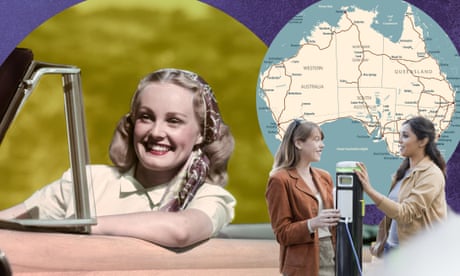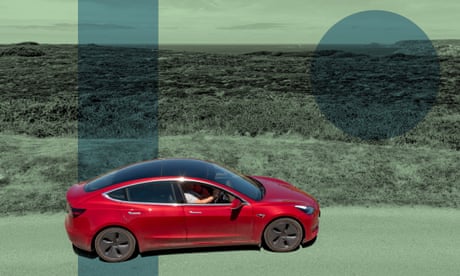Extract from The Guardian

The climate change and energy minister, Chris Bowen and transport minister, Catherine King inspect an electric car. Bowen said Labor is helping ‘Australians to drive cleaner, cheaper-to-run cars’.
EVs made up just 2% of new car sales in May 2022, but now 8.3% of new car sales in 2023 are battery powered
National strategies on electric vehicles are expected to more than double the number of charger stations again within three years, as the federal government seeks to incentivise the use of cleaner cars. New fuel efficiency standards, expected to be outlined in early 2024, are likely to further discourage the sale of higher-emitting vehicles, making electric cars more attractive.
Bowen, who also serves as energy minister, on Saturday praised new figures showing public EV charging locations had increased from 464 to about 800 between December 2022 and December 2023 – a jump of more than 70%.
Bowen said it was a record year for installing the fast chargers and claimed more had been installed in the 18 months of Labor government than in the entirety of the former Coalition government.
Bowen also pointed to 173,000 electric vehicles on Australian roads, saying two-thirds of those had come since Labor came to power.
“There’s been a 70% increase in EV charging locations this year alone – helping address the needs of Aussie drivers in regional and suburban communities and reducing wait times for tens of thousands of new EV drivers,” he said.
The National EV Strategy, with investments from federal and state governments, plans for a further 1,000 charging locations within the next three years. It also aims to instal chargers every 150 kilometres along the national highway network.
The federal government has sought to increase the uptake of electric vehicles through tax incentives and discounts. The fuel efficiency standards, expected to be outlined within months by the transport minister, Catherine King, would create a cap for emissions across a manufacturer’s overall sales and incentivise carmakers to manufacture low and zero-emission vehicles.
Industry groups such as the Electric Vehicle Council have warned Australia could become “the world’s dumping ground for dated, high-emission vehicles” without stricter fuel standards.
In August, the government revealed that the introduction of a fuel efficiency standard had been “overwhelmingly” supported throughout public consultation.
In this month’s mid-year economic update, the government tweaked the luxury car tax by tightening the definition of a fuel-efficient vehicle, reducing the maximum fuel consumption from 7 litres for every 100km, to 3.5 litres for every 100km. The measure in the Myefo documents said the change was aimed at encouraging greater take-up of more fuel-efficient vehicles.
The government believes current standards encourage carmakers to sell less fuel efficient cars – which would struggle to be sold in some other countries with stricter standards – in Australia, and therefore discourage manufacturers from selling cheaper electric vehicles in Australia.
Asked about fuel standards at a press conference on Friday the prime minister, Anthony Albanese, said King would soon respond to the issue.
“Our petrol standards have been way below everywhere else in the western world. When you have petrol standards that are lower, you have issues created – health issues – as a result of that,” he said.
“We are below not just Europe, but below the United States, and that means that Australia has needed to respond.”
Currently the government is using tax settings to incentivise the purchase of electric vehicles, with discounts making leasing an EV cheaper in some circumstances than leasing a petrol vehicle.
EVs made up 2% of new car sales in May 2022, but 8.3% of new sales in 2023.
Bowen said the government was focused on “improving access for Australians to drive cleaner, cheaper-to-run cars”.
“More and more households and businesses are saving thousands of dollars on the upfront and running costs of their vehicles – with our EV discount making leasing EVs and plug-in hybrids cheaper than leasing petrol vehicles in many circumstances,” he said.


No comments:
Post a Comment